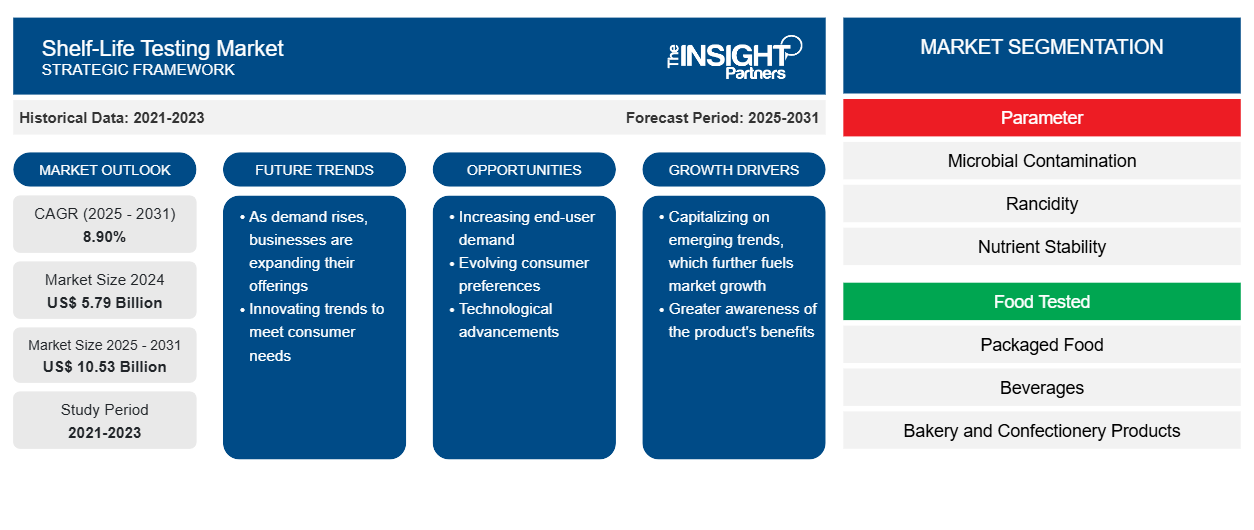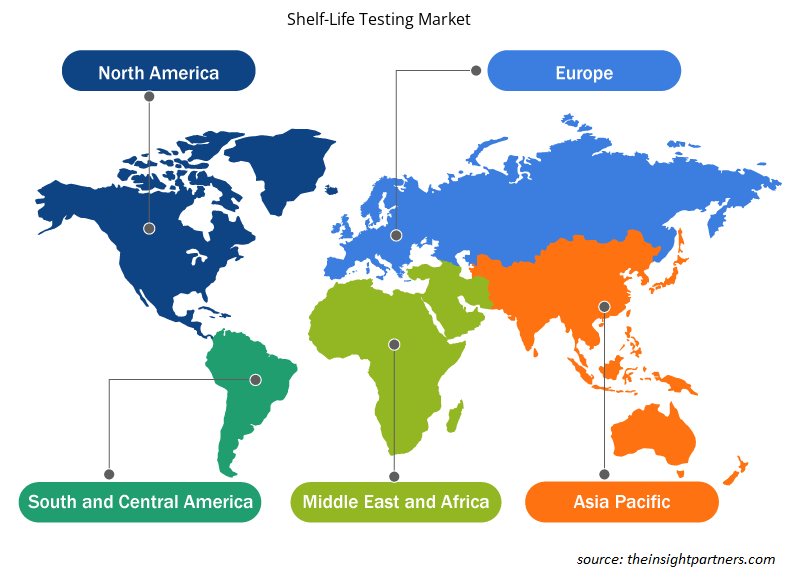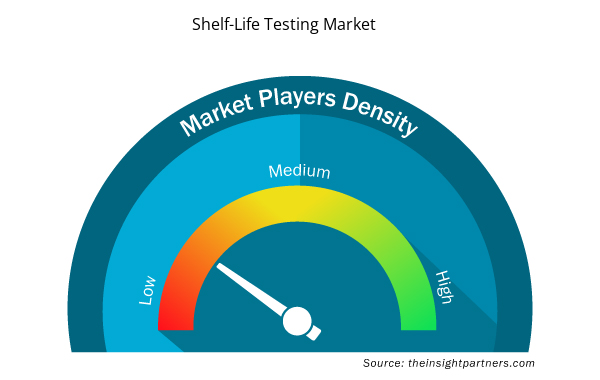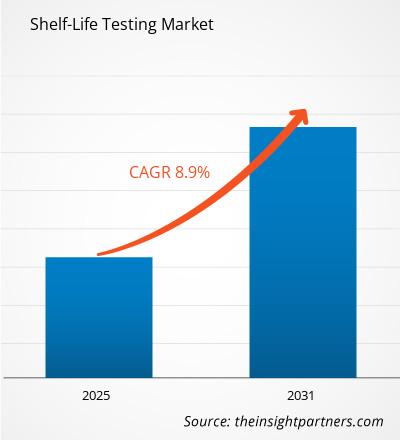The shelf-life testing market is expected to grow from US$ 4.49 billion in 2021 to US$ 8.50 billion by 2031; it is estimated to grow at a CAGR of 8.9% between 2022 and 2031.
The food processing industry has been flourishing rapidly over the years. Also, the demand for packaged and ready-to-eat food products is growing substantially. Consumers prefer to easy-to-cook packaged food products due to their hectic lifestyles. Furthermore, the increasing incidence of foodborne illness and food poisoning puts pressure on food manufacturers to apply shelf-life testing. All these factors are propelling the shelf-life market growth.
MARKET DYNAMICS
Shelf-life testing is done in a laboratory to determine the expected shelf-life of a food product and when it should be consumed. The test ensures that the product is safe for consumption. It also lowers the likelihood of product recalls; identifies the causes of decreased shelf life; helps improve products, processes, and profitability. The introduction of stringent safety regulations for food products and the increasing outbreak of foodborne illnesses propel the shelf-life testing market growth. Moreover, the surging demand for packaged and convenience food products contributes to the market growth.
MARKET SCOPE
The "Global Shelf-Life Testing Market Forecast to 2031" report aims to provide an overview of the shelf-life testing market with detailed market segmentation based on parameter, food tested, method, and technology. The report provides key statistics based on the financial performance of the leading market player. It also offers key trends and opportunities in the shelf-life testing market.
Customize This Report To Suit Your Requirement
You will get customization on any report - free of charge - including parts of this report, or country-level analysis, Excel Data pack, as well as avail great offers and discounts for start-ups & universities
Shelf-Life Testing Market: Strategic Insights

- Get Top Key Market Trends of this report.This FREE sample will include data analysis, ranging from market trends to estimates and forecasts.
Customize This Report To Suit Your Requirement
You will get customization on any report - free of charge - including parts of this report, or country-level analysis, Excel Data pack, as well as avail great offers and discounts for start-ups & universities
Shelf-Life Testing Market: Strategic Insights

- Get Top Key Market Trends of this report.This FREE sample will include data analysis, ranging from market trends to estimates and forecasts.
MARKET SEGMENTATION
The global shelf-life testing market is segmented on the basis of parameter, food tested, method, and technology. Based on parameter, the market is segmented into microbial contamination, rancidity, nutrient stability, organoleptic properties, and others. In terms of food tested, the market is segmented into packaged food, beverages, bakery and confectionery products, meat and meat products, dairy and dairy products, desserts, processed fruits and vegetables, and others. Based on method, the global shelf-life testing market is bifurcated into real-time shelf-life testing and accelerated shelf-life testing. By technology, the market is segmented into equipment and kit-based and manual tests.
REGIONAL FRAMEWORK
The global shelf-life testing market is segmented into five major regions—North America, Europe, Asia-Pacific (APAC), Middle East & Africa (MEA), and South America. The report covers the analysis and forecast of 18 countries globally along with current trends and opportunities prevailing in the region.
From the regional perspective, Europe dominates the shelf-life testing market. The market growth in Europe is driven by the highest number of testing laboratories with a high number of samples tested in the world. Further, there are many stringent regulations in the region regarding the food safety that undergo frequent updates. As a result of strict regulatory enforcement throughout the stages in the food supply chain, the highest number of sample tests are conducted in Europe for safety and quality purposes. The below figure shows the revenue growth trend in the shelf-life testing market in Europe:
The report analyzes factors, such as drivers, restraints, opportunities, and future trends, which impact the growth of the shelf-life testing market. The report also provides exhaustive Porter's five forces analysis highlighting the factors affecting the market in these regions.
IMPACT OF COVID-19 PANDEMIC
During the COVID-19 pandemic, the food and beverage industry faced unprecedented challenges due to the shortage in raw material supply, the shutdown of factories, labor shortage, and other operational difficulties under pandemic safety protocols. The shutdown of manufacturing units, difficulty in the procurement of raw materials, and restriction on logistics have negatively impacted the shelf-life testing market. The outbreak had distorted operational efficiency and disrupted the value chains due to the sudden shutdown of national and international boundaries, creating revenue loss and damage. The initial lockdown in various countries certainly affected the production of food products, hence affecting the shelf-life testing market negatively. Following state and regional guidelines, manufacturers implemented extensive measures to protect the health and safety of their employees. Many global manufacturers temporarily closed their operations or limited the production capacity. Also, in the early period of crisis, manufacturers were majorly dependent on inventory. Along with this, due to the lockdown during the pandemic, the food and hospitality facilities such as restaurants and hotels were closed down which had a negative impact on the shelf-life testing market. The closure of distribution facilities such as supermarkets & hypermarkets and specialty stores also negatively impacted the shelf-life testing market.
MARKET PLAYERS
The reports covers key developments in the shelf-life testing market. Various companies are focusing on organic growth strategies, such as product launches, product approvals, and patents and events. In addition, acquisitions, and partnership & collaborations are among the inorganic growth strategies witnessed in the market. These activities have paved way for the expansion of business and customer base of market players. The players operating in the shelf-life testing market are anticipated to experience lucrative growth opportunities in the future due to the rising demand for shelf-life testing.
The report includes the profiles of key shelf-life testing market companies along with their SWOT analysis and market strategies. In addition, the report focuses on leading industry players with information, such as company profiles, components and services offered, financial information of last three years, and key development in past five years.
Below mentioned is the list of a few companies engaged in the shelf-life testing market.
- TÜV SÜD
- Mérieux
- AsureQuality
- RJ Hill Laboratories
- Intertek Group plc
- SCS Global
- Agrifood Technology
- Symbio Laboratories
- Microchem Lab Services
- Premier Analytical Services
The Insight Partner's research and analysis team consists of experienced professionals with advanced statistical expertise and offers various customization options in the existing study.
Report ScopeShelf-Life Testing Market Regional Insights
The regional trends and factors influencing the Shelf-Life Testing Market throughout the forecast period have been thoroughly explained by the analysts at Insight Partners. This section also discusses Shelf-Life Testing Market segments and geography across North America, Europe, Asia Pacific, Middle East and Africa, and South and Central America.

- Get the Regional Specific Data for Shelf-Life Testing Market
Shelf-Life Testing Market Report Scope
| Report Attribute | Details |
|---|---|
| Market size in 2024 | US$ 5.79 Billion |
| Market Size by 2031 | US$ 10.53 Billion |
| Global CAGR (2025 - 2031) | 8.90% |
| Historical Data | 2021-2023 |
| Forecast period | 2025-2031 |
| Segments Covered |
By Parameter
|
| Regions and Countries Covered | North America
|
| Market leaders and key company profiles |
Shelf-Life Testing Market Players Density: Understanding Its Impact on Business Dynamics
The Shelf-Life Testing Market market is growing rapidly, driven by increasing end-user demand due to factors such as evolving consumer preferences, technological advancements, and greater awareness of the product's benefits. As demand rises, businesses are expanding their offerings, innovating to meet consumer needs, and capitalizing on emerging trends, which further fuels market growth.
Market players density refers to the distribution of firms or companies operating within a particular market or industry. It indicates how many competitors (market players) are present in a given market space relative to its size or total market value.
Major Companies operating in the Shelf-Life Testing Market are:
- TÜV SÜD
- Mérieux
- AsureQuality
- RJ Hill Laboratories
- Intertek Group plc
Disclaimer: The companies listed above are not ranked in any particular order.

- Get the Shelf-Life Testing Market top key players overview
- Historical Analysis (2 Years), Base Year, Forecast (7 Years) with CAGR
- PEST and SWOT Analysis
- Market Size Value / Volume - Global, Regional, Country
- Industry and Competitive Landscape
- Excel Dataset



Report Coverage
Revenue forecast, Company Analysis, Industry landscape, Growth factors, and Trends

Segment Covered
Parameter, Food Tested, Method, Technology, and Geography

Regional Scope
North America, Europe, Asia Pacific, Middle East & Africa, South & Central America

Country Scope
US, UK, Canada, Germany, France, Italy, Australia, Russia, China, Japan, South Korea, Saudi Arabia, Brazil, Argentina
Trends and growth analysis reports related to Consumer Goods : READ MORE..
The List of Companies
- TÜV SÜD
- Mérieux
- AsureQuality
- RJ Hill Laboratories
- Intertek Group plc
- SCS Global
- Agrifood Technology
- Symbio Laboratories
- Microchem Lab Services
- Premier Analytical Services

 Get Free Sample For
Get Free Sample For